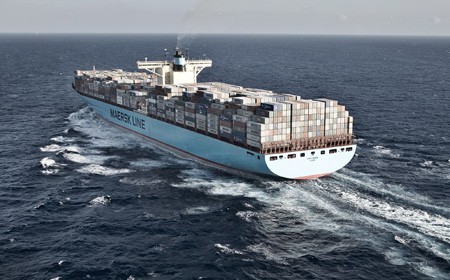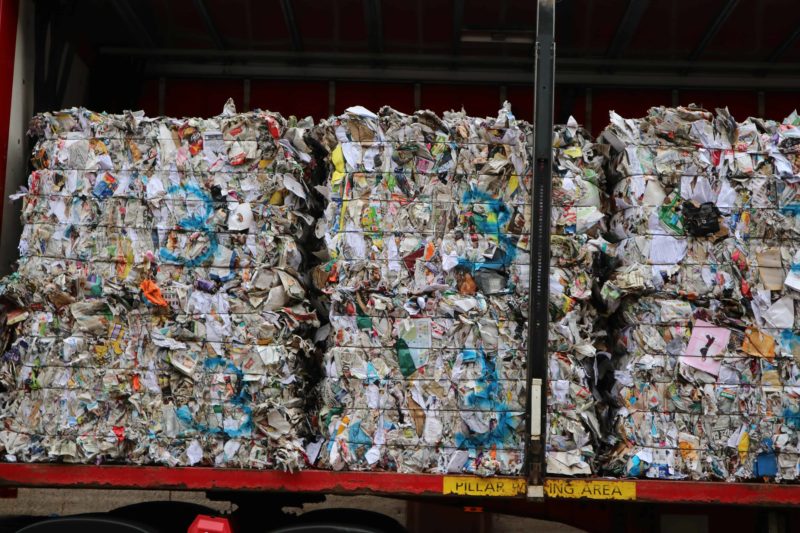A strong defence of export markets as vital to the recycling of recyclable materials collected from local authorities and businesses, has been given by the Recycling Association, in consultation responses set to Defra.
The Association has responded to consultations from Defra – the Department for Environment, Food and Rural Affairs – on consistent collections, a deposit return system and changes to the producer responsibility/packaging waste system.

Export markets are ‘vital’ for the recycling of materials collected from local authorities and businesses, the Recycling Association has said
And, as well as arguing the role of export markets, Defra is told by the Association that some of the proposals on more tracking and auditing of exports would mean that the exporter “is being subjected to unnecessary burdens. The UK is a net exporter of paper and plastics and although we expect to see investment in plastics processing in the UK, this will be a protracted process.”
The response from the Association, which has more than 100 members primarily involved in paper recycling and reprocessing, emphasises to Defra that to realise the ‘ambitions’ of the Resources and Waste Strategy it will require markets. It notes that “70% of the 3.65 million tonnes of cardboard we collected in 2018 was exported”.
End markets
Defra is told that the consultation does not address the issue of end markets “and urgent dialogue is required with ourselves and others to find workable regulatory solutions, a lot of which can be covered by new technology”.
Simon Ellin, chief executive of the Recycling Association, told letsrecycle.com: “Running through our responses to the Defra consultation is that we have concerns over pulling out all of this extra material with limited UK markets and the consequent potential effects of tightening export compliance, to the degree that it makes us uncompetitive. Overall we are advocating much more of a risk-based approach.”
Reiterating the costs burden that it believes more legislation and tracking would create, the Association states: “Do not let the actions of a small minority (illegals) tarnish the reputation of the majority compliant operators. Global markets have plenty of choice post China and expensive UK tonnage does not place the UK in a good position.”
The Association is also opposed to exporters having to give a week’s notice of shipments. It explains that “exporting of recyclables is a just in time business model and although some forward ordering and scheduling of shipments is made monthly, this very much depends on how the market is functioning – for example, in a rising market, orders will be placed weekly or often daily to maximise revenues from rising prices.
“Running through our responses to the Defra consultation is that we have concerns over pulling out all of this extra material with limited UK markets and the consequent potential effects of tightening export compliance, to the degree that it makes us uncompetitive. Overall we are advocating much more of a risk-based approach.”
Simon Ellin
Recycling Association
Similarly, agreed collection dates are constantly changing due to a variety of factors and spot orders are regularly placed to move excess stock.”
PRNs
The Association is critical of a suggestion that there might be changes to the issuing of PRNs or an equivalent when material has been exported. Defra, in its consultation, acknowledges that any shift in the evidence point could make monitoring and reporting more complex.
Defra says “Moving the point at which evidence is issued to the point at which the packaging waste has actually been reprocessed would provide more certainty that the waste has been reprocessed to a broadly equivalent standard, as well as driving efficiency and circularity of material use”.
In response, the Association declares: “This is a really bad idea and will increase the complexity and costs of the system and would turn overseas processing facilities against using UK recyclates – it will also likely to lead to the UK missing targets. There is a huge time lag with exported tonnage – for example, material can be shipped to China and not processed for three – four months after it leaves these shores, so how on this basis is the source of the material identified in the stock yard?
“Also, on this basis, the PERN [export PRN] is potentially not generated for four months putting it one or even two quarters behind… Will the same system be applied to UK mills too? There is the assumption that they are using 100% clean material and that the evidence they produce is robust – can we prove this?”
DRS
On the proposed Deposit Return System, the Association says this is really an anti-littering initiative but should include cartons and even milk in a Tetrapak. It is also suggested that cartons should be one of the core materials for collection from households if not in a DRS.
Consistency
On proposals for consistent collections by councils, it argues that the statement that a reliance by the UK recycling sector on overseas export markets for the recycling of various materials, especially paper and plastics has in recent years exposed councils and their contractors to price fluctuations and service costs is misleading and a common industry myth.
The Recycling Association tells Defra that “The export market has:
- provided [councils and contractors] them with a market for their materials when otherwise they would have had to burn it or landfill it, and;
- it has provided them with high and sustainable prices for their materials. Incineration and landfill is a cost, not a revenue and if the UK had a monopoly on markets, prices would be much lower and there is no guarantee that stability of prices would ensue.
And the consultation response continues: “Furthermore the statement that local authority costs have increased by £500,000 on average over the last year and since the China ban is again misleading. It is a small snapshot in time and does not reference all the high prices they have benefited from over previous years. It also does not cite the record cardboard prices businesses and some local authorities benefited from in 2018 from supplying China.”

Market demand for recovered commodities is essential to fulfilling the aims of the Resources and Waste Strategy, the Recycling Association says
However, the Association adds that “we do acknowledge that the UK is over-exposed to overseas markets and we need to stimulate investment in UK processing infrastructure – many of the measures in the RWS can only improve the chances of this.”
MRFs
The response also refererences materials recycling facilities. “The major factor affecting the quality of output from MRFs and other processing facilities, including those accepting multi-stream collections, is the quality of infeed. And, also taking demographics into account, we would like to see transition to separate collections where appropriate, following an assessment of the impact of EPR and consistency on output qualities.
“Following this, we are in favour of transitions to separate collections for materials where it makes a tangible difference to the quality of outputs and their subsequent compliant and sustainable final processing. We believe separating paper from other materials is a transition that should happen as contracts are renewed regardless of EPR and consistency.”
The post Recycling Association points Defra to role of export markets appeared first on letsrecycle.com.
Source: letsrecycle.com Packaging



